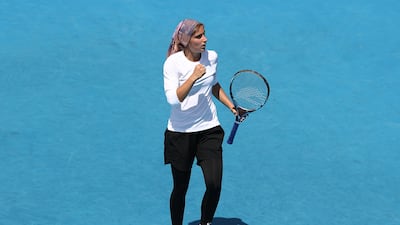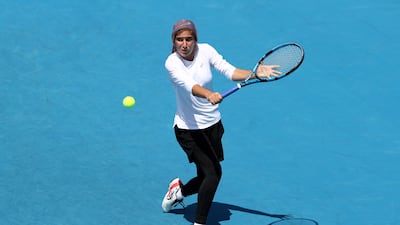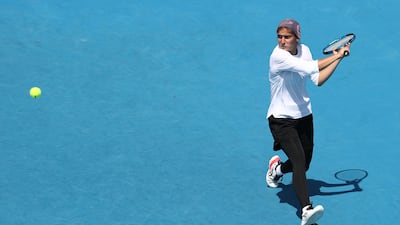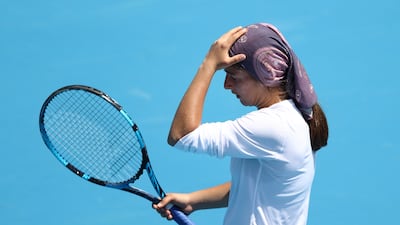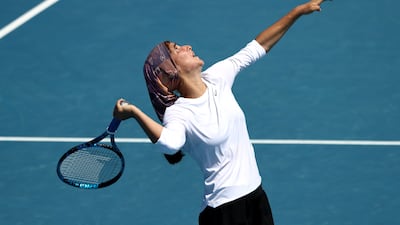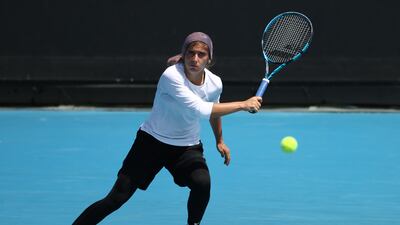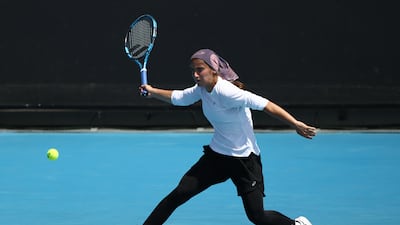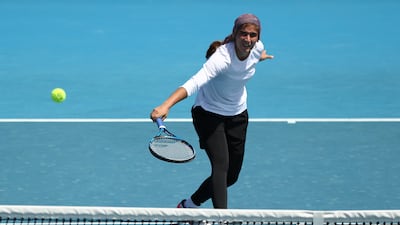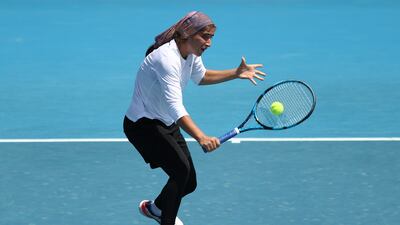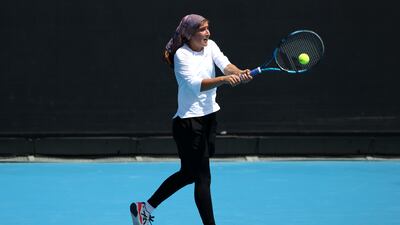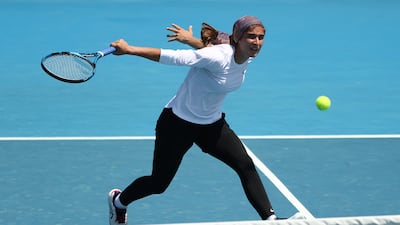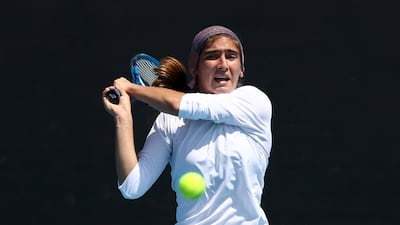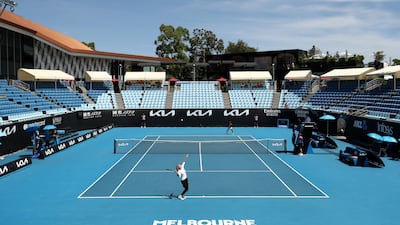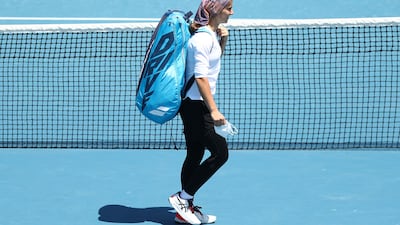The first thing Meshkatolzahra Safi did when she walked into the interview room at Melbourne Park after becoming the first Iranian girl to win a match at a Grand Slam junior event, was thank the two journalists attending the press conference for their support.
Talking to Safi, it doesn’t take long to understand how she has been able to break through in junior tennis, despite hailing from a country that hasn’t produced many champions, especially on the women’s side.
The 17-year-old, who at No 74 in the world junior rankings is Iran’s first top-100 junior player, takes great pride in breaking new ground for tennis in her nation, and is determined to show everyone back home, and the rest of the world, that what she is attempting to achieve in the sport is attainable.
“I just really want to say don’t give up on your dreams because when I started my journey, everybody in Iran was saying, ‘this is impossible, playing Grand Slams is impossible, you cannot do that’; especially to my mom. So I didn’t say my dream to anyone anymore and I just kept pushing,” Safi told The National in an interview at the Australian Open.
“So just keep pushing yourself, believe in your dreams, and don’t listen to everybody who is saying these things. This is really big for me and I hope I can continue; but I continue in every tough situation in my life, I just want to continue more.
“If you get a tough situation, just deal with that, keep your head up and just keep pushing yourself to better steps that you can reach far and far.”
On a scorching Aussie summer day at Melbourne Park, Safi took to 1573 Arena to face local qualifier Anja Nayar in the girls’ singles first round on Sunday. The Muslim teen was wearing a headscarf, full-length leggings under her shorts and a long-sleeved shirt.
She reached the Australian Open second round with a 6-4, 6-3 win in just under 90 minutes, showcasing some delicate touch and an all-court game while braving the Melbourne heat. She is the first hijabi to compete at a Grand Slam.
“I love the sun, but not this much,” joked Safi after the win. “But I’m used to this hijab and this covering. This is part of me now because I was playing with this since I was nine until today, in any tours, in any weather, cold or hot. I’m used to it.
“Of course I feel the heat, today was really, really difficult, especially between the points, but it doesn’t bother me. When you go to the match, when you play point by point, you don’t think about these things anymore.”
Safi stumbled upon tennis when she was eight years old, watching Rafael Nadal on television with her mother one day.
“In my country, if you ask which sport they like, they’ll say football. I remember the day I was watching television with my mother and we were watching Rafael Nadal, and we were so curious to see if there is any tennis court in Iran that we could go to just try,” she said.
“My family they are in love with sport, especially my father, he was a football player when he was younger and we were really curious: ‘What is tennis? Maybe I could try this?’
“When I started tennis they said I’m talented but I mean, I found out later what is ‘talented’ because when I see the players here, when I see the juniors, the pros here, I can see what is ‘talented’.”
Safi trains at Optigenpro academy in Tehran and admitted it has been a struggle figuring out a way to rise through the ranks. Besides the lack of practice partners, she says she faces great difficulty getting to tournaments, especially with no sponsors and troubles obtaining entry visas into other countries.
Despite that, Safi picked up six ITF junior singles titles in 2021 and hopes to compete in all four majors this season, provided she gets the necessary visas.
Growing up, it wasn’t easy watching tennis on TV but she hopes she can popularise the sport back home by continuing to rise through the ranks.
“I think now I’m one of the good reasons that everybody can see tennis in my country,” she said.
From a young age, Safi was keen to test her abilities against players from Europe and other regions to get a sense of her level in comparison to the rest of the world.
When I told her I was Egyptian and have covered sport in the Arab and Muslim world for over a decade, Safi immediately smiled and said: “I’m really happy to have you here today, that you can understand completely my situation as a woman in the Middle East who is playing a professional sport like tennis.”
It was an honest indication of how unique her journey is in a sport like tennis and she credits her parents for encouraging her to break through the barriers and pursue a career in the sport.
“My family is a really, really big reason that I can get here, especially my mother, she was pushing me all the time to the tournaments,” she explained.
“When I started playing ITF tournaments, I was losing every single match I played. And she was just pushing me, ‘You can get better, you can get better’, and I was really practicing hard.
“I had really, really tough times to get here. About everything, about practicing, about visas, about the tournaments… really it was hard, for my family, for my team, to get here, but we did it.
“The most important thing is that I kept pushing myself, kept practicing, kept believing, even after every match I lost, it was really sad but I was pushing myself to get better and play more tournaments so I can reach here.”
Safi names Nadal and football superstar Cristiano Ronaldo as her sporting heroes, crediting the former for introducing her to tennis and the latter for inspiring her to battle through tough moments.
“Ronaldo also had a really tough time, I was watching his documentary and I really got motivation that I can do this,” she said.
Safi’s tournament is not over yet and she is keen to keep her adventure going at the Australian Open, where she is competing in both singles and doubles.
“This was the biggest step in my career and Iranian tennis career,” she said. “I opened a new window to Iranian tennis because we didn’t have any player who played in Grand Slam juniors, or even in the pros. So I’m really happy to do that; today is a special day for Iranian tennis and I’m really happy to share this feeling with the Iranians.”
